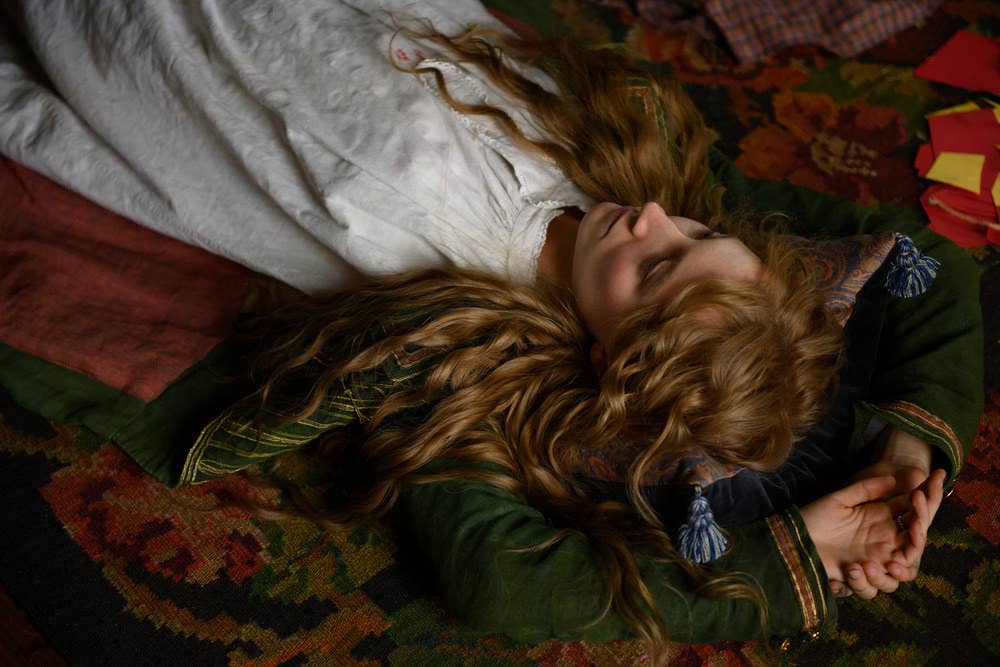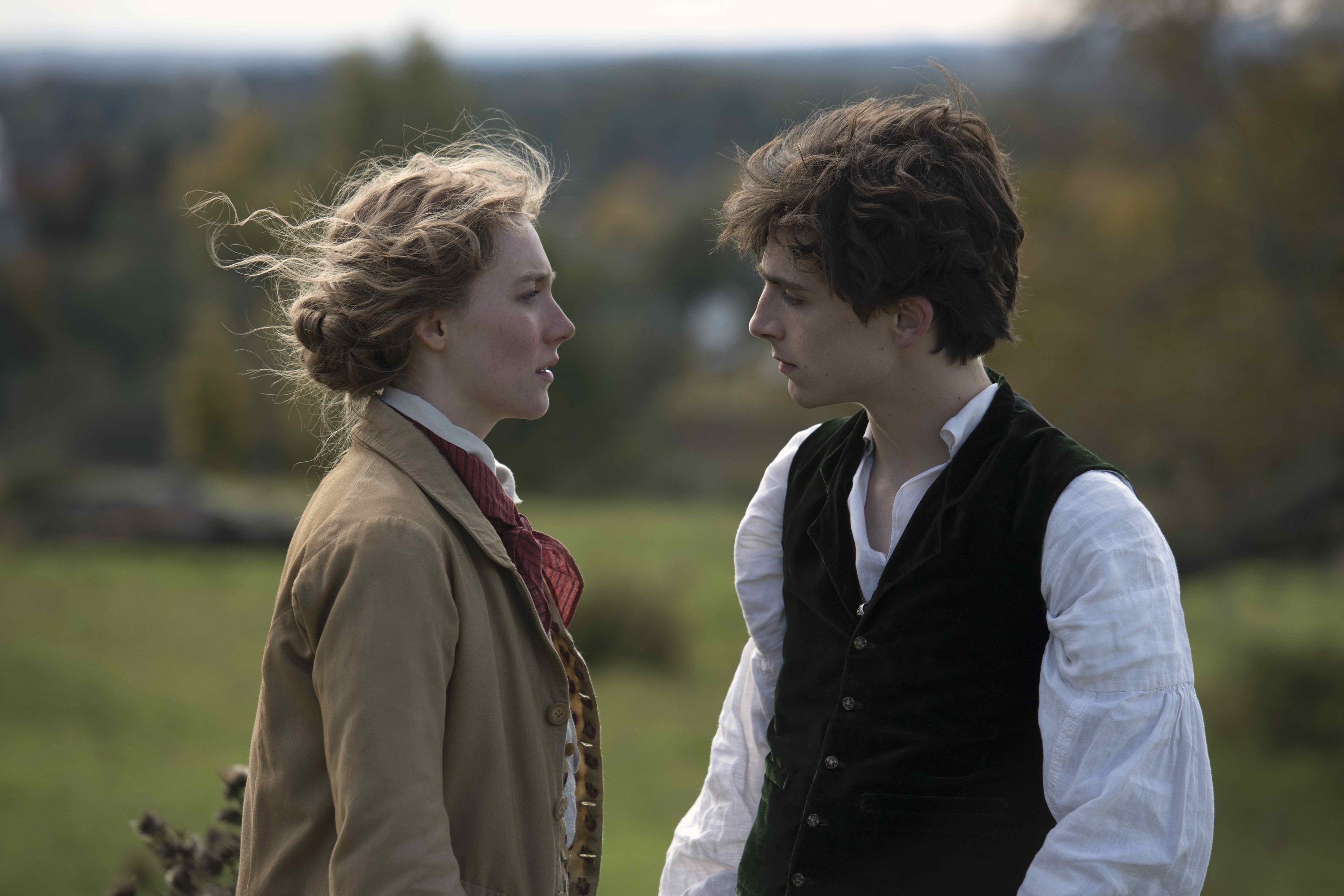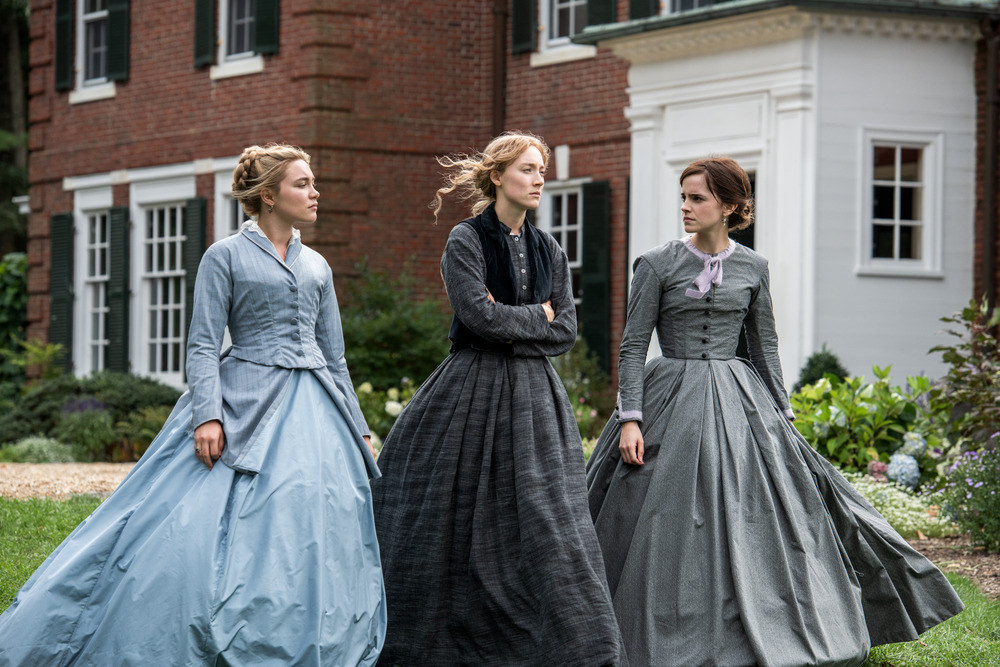
There’s a scene in Greta Gerwig’s extraordinary new adaptation of Little Women that’s been shown almost in its entirety in various previews. Jo (Saoirse Ronan), the heroine of Louisa May Alcott’s 1868 novel about four sisters living in genteel poverty in Civil War–era Massachusetts, has recently come home from New York City, where she’d tried to make it as a writer. Her sister Meg (Emma Watson) is happily married, though to a man who can’t afford to buy her pretty things; another sister, Amy (Florence Pugh), is learning to paint in Paris while attempting to secure herself a rich husband. Beth (Eliza Scanlen) is the only March girl who’s managed to avoid getting swept up in marriage madness, by virtue of her weakened heart after a spell of scarlet fever. But according to Jo’s publisher, girls in stories must all end up either married or dead. And once Beth succumbs to her illness for good, shortly after Jo returns home, Jo — still alive, still unmarried — is utterly and profoundly lost.
“Women, they have minds, and they have souls, as well as just hearts,” Jo tells her mother, Marmee (Laura Dern). “And they’ve got ambition, and they’ve got talent, as well as just beauty. I’m so sick of people saying that love is just all a woman is fit for. I’m so sick of it!”
This was the bulk of Jo’s tear-streaked speech, which we’d all heard first in the trailer for the movie. But in the film itself, her monologue comes to a surprising conclusion. Jo, who’d always vowed to become a spinster and drawn power from her stubborn sense of independence, is now questioning all the choices she’s made. She believes that women are fit for much more than love, yes. “But,” she says, “I’m so lonely.”
Greta Gerwig told Film Comment’s Devika Girish that most of Jo’s speech comes from another Alcott novel, Rose in Bloom, but that Gerwig wrote the loneliness line herself. It’s one of many changes the writer and director made when adapting her source material for the screen in 2019, and a particularly emblematic one: Jo is questioning whether she was right to refuse Laurie (Timothée Chalamet), the boy who’s always loved her, the first time around. She even goes so far as to write Laurie a letter, before he and Amy return from Paris — where, unbeknownst to Jo, they’ve eloped — to let him know she’s ready to receive him at last.
Sorry to the purists, but you guys: This girl is g-a-y.
I saw Little Women in my hometown theater with my aunt and my cousin; when Jo put that letter into the mailbox where she, her sisters, and Laurie would correspond between their houses as children, they were absolutely losing it. “What…is…happening!?” my cousin whisper-yelled. Like me, she and her mother are Little Women superfans (of both Alcott’s book and Gillian Armstrong’s 1994 adaptation, in particular), and they couldn’t believe that Gerwig had dared portray Jo with a new dose of doubt.
I, however, was thrilled by the choice to have Jo second-guess the way she’d rejected Laurie. True believers in the ending of Alcott’s novel, which sees Jo fall for the middle-aged German immigrant Professor Bhaer (played by Louis Garrel in the new movie), tend to argue that Laurie was never the right fit for Jo. He’s too frivolous, too vain, while the professor, her true match, is committed to an intellectual life and takes her work seriously. But I never bought it.
For one thing, I don’t think Alcott even really wanted us to — in a now-famous letter to a friend, she called Bhaer “a funny match” she came up with “out of perversity” in the face of readers’ demands that Jo marry someone. And for another, I don’t assume that what Jo really needed in a partner was someone who could validate her talent. She’s got plenty of other people in her life for that: her publisher, her readers, her family. But someone who makes her laugh, who brings out her goofier side, who inspires and charms her? I could totally see Jo with Laurie. I’ve always believed that she did really love him, as a family member and a friend, but she wasn’t in love with him — because she simply couldn’t be. Sorry to the purists, but you guys: This girl is g-a-y.

Jo, in all her tomboyish glory, has set off queer readers’ gaydars for 150 years now, and Gerwig’s adaptation, without being too explicit about it, does gorgeous justice to that reading. This version of Little Women can’t be boiled down to the false choice between one man and another or even reduced to the binary of romance versus professional and personal fulfillment.
Ronan choking out “but I’m so lonely” does so much of that work: Jo admits that, as much as she would relish the opportunity to live a life that isn’t defined by marriage, she’d still like to find love. And if she can’t find it with Laurie or with Professor Bhaer, might she someday with a woman?
Alcott, who never married, might very well have wished for the same. As Girish put it in Film Comment, “Alcott has said things that sound like she might have been what we think of today as queer.” To account for her “spinsterhood,” Alcott once explained, “I am more than half-persuaded that I am a man’s soul put by some freak of nature into a woman’s body … because I have fallen in love with so many pretty girls and never once the least bit with any man.”
Gerwig agreed: “I didn’t want to assign anything that felt too modern to her but…there’s lots of stuff.” She mentioned the unmarried woman at Jo’s boarding house who becomes her best friend there, and whom she wasn’t ultimately able to include in the movie: “You think, ‘Wait, is that secretly you, Louisa?’”
I recognized some of myself in Jo’s sense of difference — her sense of queerness.
Ronan, speaking with Out magazine, also acknowledged the possibility that her character could be queer. “I think she was self-aware enough to know that there was something different about her and something that made her sort of different from even her other sisters,” she said. “And I think if she had had the language or even a term that she could use, [she’d be able to say] ‘Oh, maybe this is how I feel,’ or ‘This is what I am and that's okay.’”
As a kid reading Little Women for the first or fourth or eleventh time, I recognized some of myself in Jo’s sense of difference — her sense of queerness — even though neither of us could describe what made us so. Perhaps Alcott, too, didn’t have the words. But Gerwig, with her masterfully meta ending, creates room for the possibility.
Jo haggles with her publisher, at first attempting to submit her autobiographical novel without her heroine choosing to marry either of her suitors. The publisher is flabbergasted and reminds her: “Girls want to see women married, not consistent." Jo only acquiesces to write in a new romantic ending if she’s able to retain her own copyright and earn a higher percentage of the book’s profits. The movie thus offers us two alternate endings. First, there’s Jo kissing the professor under his umbrella, the finale with which we’re all familiar, followed by her waltzing through her grand new school for boys and girls, where she and Bhaer both teach; then there’s Jo seemingly partner-free, but embracing her own published book in her arms.
Gerwig gets to have it both ways, and we, as viewers, get to choose what we believe is Jo’s “real” fate. To me, what feels real is indisputable: Jo marries her novel’s character off to please the masses, but in her actual life, being a single and accomplished writer is her true happy ending. After all, that would mirror Alcott’s own journey. The romance of Little Women was never really about the relationships at all; Jo’s fight to remain unabashedly herself in a man’s world and to achieve her dream of a writer’s life against all odds — that was the real love story.

In the original world of Little Women, it wasn’t possible for Jo to emerge from her story without committing to a man. But what makes Gerwig’s film so magical is that it delights in the possibilities of stories to continually change form, to over time reveal new truths. By layering different timelines and even different endings into the narrative, Gerwig reveals the ways in which all our lives are just a single decision away from being set upon a completely different path.
And when she puts that letter to Laurie in the mailbox, Jo, like so many queer girls — like so many girls who, for whatever reason, don’t want to live by men’s rules — has a moment of doubt in which she considers the possibility of living a more “normal” life, in the most tolerable way she sees available to her. The queerest thing about Gerwig’s adaptation is that it refuses to assume Little Women’s characters, like all of us, are essentially anything — not only whether we’re queer or straight, but whether we’re strictly predestined for any specific sort of life.
The queerest thing about Gerwig’s adaptation is that it refuses to assume Little Women’s characters, like all of us, are essentially anything.
In fact, I don’t think Laurie was predestined for straight marriage, either. I’ve always read him as a queer figure: androgynous, impish, game to play dress-up with a bunch of sisters. He’s an offbeat, lonely, orphaned boy awash in a big, empty house who’s always longed above all for a family. In Jo, he sees adventure, daring, transgression. They’re two little queer kids attempting to spin their fantasies into reality. But the crush of normativity eventually catches up with them: Jo, at least in the novel, is eventually pushed into straight marriage, while Laurie, in both the novel and the movie, attempts to fulfill at least half of his fantasy with Amy. Toward the end of the film, when Amy puts their baby into Laurie’s arms and he does an awkward little jiggle, I laughed aloud; Chalamet looks like he’s attempting to portray the family patriarch but failing miserably. For Laurie, it’s a fitting ending.
There’s a lovely scene toward the end of Gerwig’s film that acknowledges fiction’s power to give us the tools to define and shape our own experiences. Jo is walking with Meg and Amy outside Plumfield, the house that Aunt March (Meryl Streep) left to Jo in her will. Jo tells her sisters about her new project — the book that will become Little Women — though she’s nervous that no one will really care about the “domestic joys and struggles” of a group of sisters.
“Writing doesn’t confer importance,” Jo says. “It reflects it.”
Amy disagrees, in one of many touching moments for the newly rehabilitated character. “Writing things,” she says, “is what makes them important.”
Gerwig’s film is ultimately about how fiction doesn’t merely represent life as we know it; stories give shape to our lives, too, guiding us toward new modes of thinking or being that we may have otherwise thought impossible. I don’t think there’s necessarily a “true” Jo March who’s been waiting all these years for people to realize she’s gay, any more than I think that either of the men Jo considers spending her life with is her “true” match. But what I love about this version of Little Women is that it creates a world in which she could be. ●
